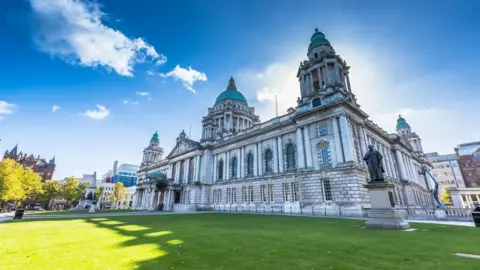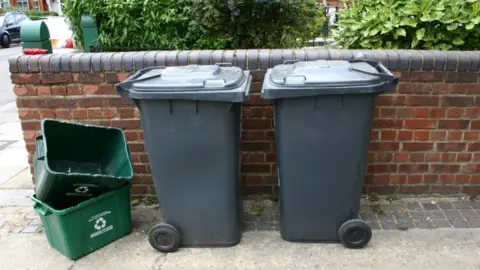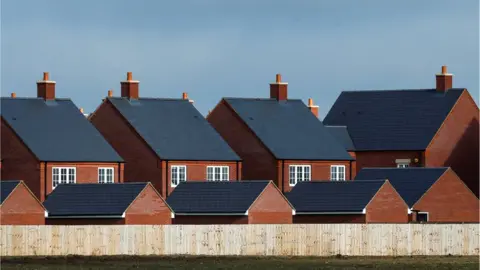NI local elections: What do councils do?
 BBC
BBCOn Thursday, voters will go to the polls to elect 462 councillors to Northern Ireland's 11 councils.
But what do those councils actually do?
It is a question that perhaps comes up when people wonder where to turn when they are faced with concerns such as potholes in the roads or access to care homes.
Those may be local problems - but they are not dealt with by your council.
So what do councils have responsibility for?
- Local planning
- Waste collection and disposal
- Street cleaning
- Parks and leisure
- Cemeteries
- Economic development
- Off-street parking
- Arts, heritage and cultural facilities
- Registration of births, deaths and marriages
That is not an exhaustive list - for example, dog control, entertainment licensing, litter enforcement and food safety all come under wider categories.
Those responsibilities changed considerably after the reorganisation of local government in 2015 and the reduction in the number of councils from 26 to 11.
Perhaps the biggest change to emerge from the reorganisation was the handing of planning powers to the councils.

Full council meetings are usually held once a month, with work on areas such as licensing or planning mostly being delegated to committees.
The responsibilities held by Northern Ireland's councils vary considerably from those existing in other parts of the UK.
And councils in the Republic of Ireland have a much bigger portfolio of responsibilities.
Notably they include powers over housing and roads - neither of those is the responsibility of councils in Northern Ireland.
What are councils not responsible for?
- Education
- Public housing
- Policing
- Fire service
- Roads
- Transport
- Libraries
Those services are controlled by the Northern Ireland Executive, leading some people to see the political impasse at Stormont as an argument in favour of extending councils' powers.

What are the 11 councils in Northern Ireland?
- Antrim and Newtownabbey Borough Council
- Ards and North Down Borough Council
- Armagh City, Banbridge and Craigavon Borough Council
- Belfast City Council
- Causeway Coast and Glens Borough Council
- Derry City and Strabane District Council
- Fermanagh and Omagh District Council
- Lisburn and Castlereagh City Council
- Mid and East Antrim Borough Council
- Mid Ulster District Council
- Newry, Mourne and Down District Council
How much are councillors paid?
Being a councillor is not intended to be a full-time job but councillors get an annual allowance to £15,071.
Civic dignitaries and councillors with extra responsibilities may be paid an additional allowance.
For example, the lord mayor of Belfast has an extra allowance of £34,800 for their year in office.
Where do councils get their money from?
Funding for the councils' activities comes from a number of sources, with rates being the best known.
Rates are a property tax used to pay for both local and regional services.
They are paid by both homeowners and businesses based on the capital value of their property.
Councils also receive funds in the form of grants from the Department for Communities, fees for certain services and loans.
 Reuters
ReutersThe Northern Ireland Local Government Association, which represents the interests of all 11 councils, has called for greater powers for its members.
It has pointed out that councils were responsible for less than 4% - £738m - of public spending in Northern Ireland in 2015-16, compared with 27% in Scotland and Wales.
One of the latest developments on the Northern Ireland local authority scene is the move towards a city deal for Belfast and the surrounding region.
More than 30 local authorities across Britain already benefit from city deals, which are designed to give them more spending and decision-making powers.
Northern Ireland Secretary Karen Bradley recently signed off a business case for the deal that would cover Belfast city and six other surrounding councils.
That would lead to an investment of £350m into the region over the next 15 years.
